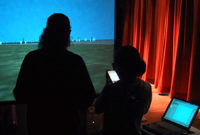Moher & Johnson Collaborate With Northwestern University on Nanotechnology Research
October 1st, 2004 - September 30th, 2007
Categories: Devices, Education, Software

About
EVL faculty members Tom Moher and Andrew Johnson, along with UIC Distinguished Professor Jim Pellegrino are partners in the 3 year $6,000,000 NSF-funded Nanoscale Science and Engineering Education Center for Learning and Teaching Program, led by Principal Investigator Bob Chang of Northwestern University.
The Nanoscale Science and Engineering Education (NSEE) Center for Learning and Teaching (NCLT) project entitled “NCLT: A Center to Develop Nanoscale Science and Engineering Educators with Leadership Capabilities” focuses on the research and development of nano-science instructional resources for grades 7-16, related professional development opportunities for 7-12 teachers, and programs infused with nano-science content for education doctoral students. The Center will bring together educators and scientists from several areas of nano-science and engineering research to collaborate with science teachers and doctoral candidates in education on both the development of the resources and research on their efficacy.
Lead partners in the Center are Northwestern University, Purdue University, University of Michigan, University of Illinois at Chicago and University of Illinois at Urbana-Champaign. Additional partners include Argonne National Laboratory, West Point Military Academy, Alabama A & M University, Fisk University, Hampton University, Morehouse College and University of Texas at El Paso. The additional partners will widen the geographic range of the project, expanding opportunities to reach a diverse and currently underrepresented population of graduate students, teachers and ultimately students. STEM, education faculty and researchers from the partner institutions will participate in interdisciplinary teams to address the Center’s mission: provide national education leadership and resources for advancing NSEE; create and implement professional development programs in NSEE; use innovative ideas in learning to design instructional materials for grades 7-16; and, conduct research relating to integration of NSEE into science, technology, engineering and mathematics (STEM) education.